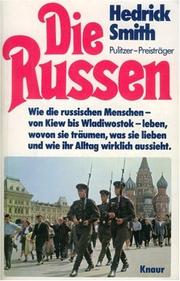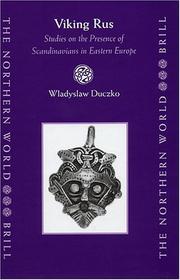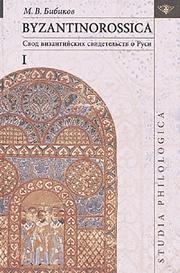| Listing 1 - 10 of 28 | << page >> |
Sort by
|
Book
ISBN: 8290250738 Year: 1996 Publisher: Oslo : Universitetet i Oslo, Slavisk-baltisk avdeling,
Abstract | Keywords | Export | Availability | Bookmark
 Loading...
Loading...Choose an application
- Reference Manager
- EndNote
- RefWorks (Direct export to RefWorks)
Rusʹ (The Slavic word). --- Russia --- Name.

Abstract | Keywords | Export | Availability | Bookmark
 Loading...
Loading...Choose an application
- Reference Manager
- EndNote
- RefWorks (Direct export to RefWorks)
Ibn Fadlan, Ahmad --- Kievan Rus --- -History --- -Sources --- Ibn Faḍlān, Aḥmad, --- Древняя Русь --- Drevni︠a︡i︠a︡ Rusʹ (Medieval state) --- Киевская Русь --- Kievskai︠a︡ Rusʹ (Medieval state) --- Ruce --- Русь --- Rusʹ --- Kyïvsʹka Rusʹ --- Kieŭskai︠a︡ Rusʹ --- Kiev (Medieval state) --- Rus' Kieviana --- History --- Sources. --- Київська Русь --- Kyivan Rusʹ --- Drevni︠a︡i︠a︡ Rusʹ --- Kievskai︠a︡ Rusʹ

ISBN: 9004138749 9786610915217 9047405439 1280915218 1429409967 9781429409964 9789004138742 Year: 2004 Volume: 12 Publisher: Leiden Brill
Abstract | Keywords | Export | Availability | Bookmark
 Loading...
Loading...Choose an application
- Reference Manager
- EndNote
- RefWorks (Direct export to RefWorks)
History of Scandinavia and Iceland --- History of Eastern Europe --- anno 500-1499 --- Kievan Rus --- History --- Kyivan Rus --- Drevni︠a︡i︠a︡ Rusʹ (Medieval state) --- Kieŭskai︠a︡ Rusʹ --- Kievskai︠a︡ Rusʹ (Medieval state) --- Kiev (Medieval state) --- Kyivan Rusʹ --- Kyïvsʹka Rusʹ --- Ruce --- Rusʹ --- Rus' Kieviana --- Древняя Русь --- Киевская Русь --- Київська Русь --- Русь --- History. --- Drevni︠a︡i︠a︡ Rusʹ --- Kievskai︠a︡ Rusʹ
Book
ISBN: 131653023X 1107652561 Year: 2013 Publisher: Cambridge : Cambridge University Press,
Abstract | Keywords | Export | Availability | Bookmark
 Loading...
Loading...Choose an application
- Reference Manager
- EndNote
- RefWorks (Direct export to RefWorks)
Nora Kershaw Chadwick (1891-1972) was a prominent historian and literary scholar. Originally published in 1946, this book presents an examination by Chadwick of early Russian written sources. The text discusses Russia's rich historical traditions and chronicles, and assesses the extent of oral elements. These areas are related to Greek, Oriental and Scandinavian writings. The various traditions within the Russian chronicles are isolated and studied in detail. This book will be of value to anyone with an interest in Russian history and Russian historical sources.
Povestʹ vremennykh let. --- Повесть временных лет --- Povistʹ vremennykh lit --- Повість временних літ --- Primary Chronicle --- Tale of Bygone Years --- Kievan Rus --- Drevni︠a︡i︠a︡ Rusʹ (Medieval state) --- Kieŭskai︠a︡ Rusʹ --- Kievskai︠a︡ Rusʹ (Medieval state) --- Kiev (Medieval state) --- Kyivan Rusʹ --- Kyïvsʹka Rusʹ --- Ruce --- Rusʹ --- Rus' Kieviana --- Древняя Русь --- Киевская Русь --- Київська Русь --- Русь --- History --- Drevni︠a︡i︠a︡ Rusʹ --- Kievskai︠a︡ Rusʹ
Book
ISBN: 5867891402 Year: 2003 Publisher: Sankt-Peterburg : Russko-Baltijskij informacionnyj centr "BLIC",
Abstract | Keywords | Export | Availability | Bookmark
 Loading...
Loading...Choose an application
- Reference Manager
- EndNote
- RefWorks (Direct export to RefWorks)
Manuscripts, Russian (Old) --- Manuscripts, Old Russian --- Old Russian manuscripts --- Russian manuscripts (Old) --- Kievan Rus --- Drevni︠a︡i︠a︡ Rusʹ (Medieval state) --- Kieŭskai︠a︡ Rusʹ --- Kievskai︠a︡ Rusʹ (Medieval state) --- Kiev (Medieval state) --- Kyivan Rusʹ --- Kyïvsʹka Rusʹ --- Ruce --- Rusʹ --- Rus' Kieviana --- Древняя Русь --- Киевская Русь --- Київська Русь --- Русь --- History --- Manuscripts, Russian (Old). --- Drevni︠a︡i︠a︡ Rusʹ --- Kievskai︠a︡ Rusʹ
Book
ISBN: 9780674063846 Year: 2012 Publisher: Cambridge Harvard university press
Abstract | Keywords | Export | Availability | Bookmark
 Loading...
Loading...Choose an application
- Reference Manager
- EndNote
- RefWorks (Direct export to RefWorks)
Christianity --- Christianisme --- Kievan Rus --- Europe --- Russie kiévienne --- History --- Civilization --- Relations --- Histoire --- Civilisation --- Byzantine influences. --- Russie kiévienne --- Religions --- Church history --- Древняя Русь --- Drevni︠a︡i︠a︡ Rusʹ (Medieval state) --- Киевская Русь --- Kievskai︠a︡ Rusʹ (Medieval state) --- Ruce --- Русь --- Rusʹ --- Kyïvsʹka Rusʹ --- Kieŭskai︠a︡ Rusʹ --- Kiev (Medieval state) --- Rus' Kieviana --- Ukraine --- Byzantine Empire --- Council of Europe countries --- Eastern Hemisphere --- Eurasia --- Київська Русь --- Kyivan Rusʹ --- Kyivan Rus --- Drevni︠a︡i︠a︡ Rusʹ --- Kievskai︠a︡ Rusʹ

ISBN: 9785955103334 5955100423 Year: 2004 Publisher: Moskva I︠a︡zyki slavi︠a︡nskoj kul'tury
Abstract | Keywords | Export | Availability | Bookmark
 Loading...
Loading...Choose an application
- Reference Manager
- EndNote
- RefWorks (Direct export to RefWorks)
Russian language --- Etymology --- Names --- Kievan Rus --- Russia --- Byzantine Empire --- History --- Historiography. --- Relations --- Byzantine empire --- Slavic languages, Eastern --- Древняя Русь --- Drevni︠a︡i︠a︡ Rusʹ (Medieval state) --- Киевская Русь --- Kievskai︠a︡ Rusʹ (Medieval state) --- Ruce --- Русь --- Rusʹ --- Kyïvsʹka Rusʹ --- Kieŭskai︠a︡ Rusʹ --- Kiev (Medieval state) --- Rus' Kieviana --- Byzantium (Empire) --- Vizantii︠a︡ --- Bajo Imperio --- Bizancjum --- Byzantinē Autokratoria --- Vyzantinon Kratos --- Vyzantinē Autokratoria --- Impero bizantino --- Bizantia --- Київська Русь --- Empire byzantin --- Russie --- Kyivan Rusʹ --- Drevni︠a︡i︠a︡ Rusʹ --- Kievskai︠a︡ Rusʹ
Book
ISBN: 9781107156760 9781316661543 1107156769 1108814840 1316997545 1316661547 1108660908 Year: 2019 Volume: 112 Publisher: Cambridge Cambridge University Press
Abstract | Keywords | Export | Availability | Bookmark
 Loading...
Loading...Choose an application
- Reference Manager
- EndNote
- RefWorks (Direct export to RefWorks)
The chroniclers of medieval Rus were monks, who celebrated the divine services of the Byzantine church throughout every day. This study is the first to analyze how these rituals shaped their writing of the Rus Primary Chronicle, the first written history of the East Slavs. During the eleventh century, chroniclers in Kiev learned about the conversion of the Roman Empire by celebrating a series of distinctively Byzantine liturgical feasts. When the services concluded, and the clerics sought to compose a native history for their own people, they instinctively drew on the sacred stories that they sang at church. The result was a myth of Christian origins for Rus - a myth promulgated even today by the Russian government - which reproduced the Christian origins myth of the Byzantine Empire. The book uncovers this ritual subtext and reconstructs the intricate web of liturgical narratives that underlie this foundational text of pre-modern Slavic civilization.
Christianity and culture --- Orthodox Eastern Church --- History. --- Liturgy --- Kievan Rus --- Liturgie byzantine --- Liturgie slave --- Boris et Gleb --- Kyivan Rus --- Contextualization (Christian theology) --- Culture and Christianity --- Inculturation (Christian theology) --- Indigenization (Christian theology) --- Culture --- Drevni︠a︡i︠a︡ Rusʹ (Medieval state) --- Kieŭskai︠a︡ Rusʹ --- Kievskai︠a︡ Rusʹ (Medieval state) --- Kiev (Medieval state) --- Kyivan Rusʹ --- Kyïvsʹka Rusʹ --- Ruce --- Rusʹ --- Rus' Kieviana --- Древняя Русь --- Киевская Русь --- Київська Русь --- Русь --- Drevni︠a︡i︠a︡ Rusʹ --- Kievskai︠a︡ Rusʹ
Book
ISBN: 9004260226 9789004260221 9789004259829 9004259821 1306028019 Year: 2013 Publisher: Leiden, Netherlands : Koninklijke Brill NV,
Abstract | Keywords | Export | Availability | Bookmark
 Loading...
Loading...Choose an application
- Reference Manager
- EndNote
- RefWorks (Direct export to RefWorks)
In The Nature and the Image of Princely Power in Kievan Rus', 980-1054 , Walter K. Hanak offers a critical analysis of the annalistic, literary, and other works that provide rich if conflicting and contradictory information on the nature of princely power and their image or literary representations. The primary sources demonstrate an interaction between the reality and the notions concerning princely power and how this power generates an image of itself. The author also analyses the textual incongruities that appear to be a reflection of a number of currents -- Byzantine, Varangian, Khazar, and Eastern Slavic. The secondary sources provide a variety of interpretations, which Hanak seeks to uphold and dispute. His stress, however, is to view this evidence in the light of a newly Christianized state and the launching of a maturative process in its early history.
Princes --- Royalty --- Courts and courtiers --- Kievan Rus --- Ukraine --- Drevni︠a︡i︠a︡ Rusʹ (Medieval state) --- Kieŭskai︠a︡ Rusʹ --- Kievskai︠a︡ Rusʹ (Medieval state) --- Kiev (Medieval state) --- Kyivan Rusʹ --- Kyïvsʹka Rusʹ --- Ruce --- Rusʹ --- Rus' Kieviana --- Древняя Русь --- Киевская Русь --- Київська Русь --- Русь --- History --- Kings and rulers. --- Sources. --- Russie kiévienne --- Histoire --- Rois et souverains --- Sources --- Kyivan Rus --- Drevni︠a︡i︠a︡ Rusʹ --- Kievskai︠a︡ Rusʹ
Book
ISBN: 0674065468 0674068548 9780674068544 9780674065468 9780674063846 0674063848 Year: 2012 Publisher: Cambridge, Massachusetts
Abstract | Keywords | Export | Availability | Bookmark
 Loading...
Loading...Choose an application
- Reference Manager
- EndNote
- RefWorks (Direct export to RefWorks)
An overriding assumption has long directed scholarship in both European and Slavic history: that Kievan Rus' in the tenth through twelfth centuries was part of a Byzantine commonwealth separate from Europe. Christian Raffensperger refutes this conception and offers a new frame for two hundred years of history, one in which Rus' is understood as part of medieval Europe and East is not so neatly divided from West.With the aid of Latin sources, the author brings to light the considerable political, religious, marital, and economic ties among European kingdoms, including Rus', restoring a historical record rendered blank by Rusianmonastic chroniclers as well as modern scholars ideologically motivated to build barriers between East and West. Further, Raffensperger revises the concept of a Byzantine Commonwealth that stood in opposition to Europe-and under which Rus' was subsumed-toward that of a Byzantine Ideal esteemed and emulated by all the states of Europe. In this new context, appropriation of Byzantine customs, law, coinage, art, and architecture in both Rus' and Europe can be understood as an attempt to gain legitimacy and prestige by association with the surviving remnant of the Roman Empire. Reimagining Europe initiates an expansion of history that is sure to challenge ideas of Russian exceptionalism and influence the course of European medieval studies.
Christianity --- Religions --- Church history --- Europe --- Kievan Rus --- Ukraine --- Council of Europe countries --- Eastern Hemisphere --- Eurasia --- Byzantine Empire --- Drevni︠a︡i︠a︡ Rusʹ (Medieval state) --- Kieŭskai︠a︡ Rusʹ --- Kievskai︠a︡ Rusʹ (Medieval state) --- Kiev (Medieval state) --- Kyivan Rusʹ --- Kyïvsʹka Rusʹ --- Ruce --- Rusʹ --- Rus' Kieviana --- Древняя Русь --- Киевская Русь --- Київська Русь --- Русь --- Relations --- Civilization --- Byzantine influences. --- History --- Kyivan Rus --- Drevni︠a︡i︠a︡ Rusʹ --- Kievskai︠a︡ Rusʹ
| Listing 1 - 10 of 28 | << page >> |
Sort by
|

 Search
Search Feedback
Feedback About UniCat
About UniCat  Help
Help News
News